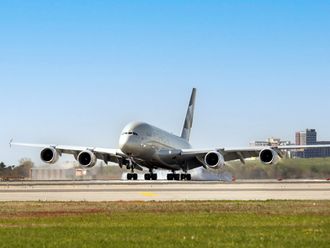Dubai Middle East airlines saw passenger demand in January recording traffic growth of 14.5 per cent over the same month last year, marking a return to 2010 levels, according to new statistics released yesterday by the International Air Transport Association.
The global aviation body said the performance by the region's airlines in the period marked the "largest rate of growth by far for any region".
Their capacity, meanwhile, increased 10.6 per cent as the load factor climbed 2.7 points to 78.5 per cent — among the highest of the regions, according to IATA.
Globally, passenger traffic increased 5.7 per cent in January from the same month in 2011, but freight traffic experienced an eight per cent decline.
IATA said the occurrence of the Chinese New Year in January (rather than in February as in 2011) "exaggerated the increase" in passenger demand and a fall in air freight.
Middle Eastern carriers, meanwhile, enjoyed a 9.4 per cent rise in freight demand, marking the healthiest performance among the regions, IATA said.
"The year started with some hopeful news on business confidence. It appears that freight markets have stabilised, albeit at weak levels. And this is having a positive impact on business-related travel. However, airlines face two big risks: rising oil prices and Europe's sovereign debt crisis. Both are hanging over the industry's fortunes like the sword of Damocles," said IATA's director general and CEO Tony Tyler.
International air travel rose 5.5 per cent in January, as per IATA estimates, while capacity climbed 4.2 per cent, resulting in a load factor of 76.6 per cent, up from 75.7 per cent in January last year. It added that domestic markets outperformed international markets in aggregate as strong demand in Brazil, China and India helped to push domestic traffic up 6.1 per cent over January 2011.
Open Skies pact signed
The UAE has signed service agreements with 146 countries including ‘open sky' deals with 104 countries.
The UAE General Civil Aviation Authority (GCAA) said it had signed an open sky air services agreement with the Comoros.
Sultan Bin Saeed Al Mansouri, Minister of Economy and Chairman of the GCAA, underlined the importance of the open sky policy adopted by the UAE, which has contributed to strengthening the country's economic position as a strategic destination and trade hub in the region, and also attracted new airlines to the UAE.












